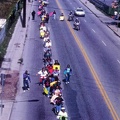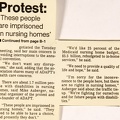Nashville Banner,
Monday September 27, 1993
Local & State
Tennessee B-2
[This article appears in photos ADAPT 812 and ADAPT 808 but the entire text is included here for easier reading.]
Photo by Larry McCormick: A man (Bob Kafka) in an ADAPT T-shirt and a denim hat, with curly grey and dark hair and beard looks to the sky as he speaks. Across from him a bald heavy set policeman looks to the ground and leans on the door of his cruiser. Behind them you can see another policeman and protester.
Caption reads: Bob Kafka (lefl), an ADAPT leader, negotiates for more time with police Lt. Don Heath, who was almost out of patience.
2nd Photo by Larry McCormick: A seven lane road almost devoid of cars is seen from the sky. Toward the front of the photo, two lines of people cross the entire width of the road, blocking all the lanes. Caption reads: The ADAPT protest forced police to block off traffic on McGavock Pike.
[Title] Protest strands tourists; Disabled rights activists demand more funding
By Rob Moritz, Banner Staff Writer
When a group of disabled activists picketed the entrance to the Opryland Hotel, innocent bystanders — tourists — felt the pinch.
“We just wanted to do some shopping and got stuck in the traffic," said Greg Day of Indiana, standing with his wife and son in a parking lot across from the hotel's entrance.
"We had to drive all the way around to get here. It's very inconvenient," he said.
“All the roads are blocked, and we can't get out and see what we came to Nashville to see,“ Guy Eskew of Toronto said.
About 300 members of Americans Disabled for Attendant Programs Today blocked the intersection at the entrance to the Opryland Hotel for more than two hours Sunday, demanding to meet with Paul Willging, executive vice president of American Health Care Association.
AHCA, which represents nursing homes, is having its annual meeting at the hotel through Wednesday.
ADAPT wants to meet with association members to ask for help in efforts to divert 25 percent of all Medicaid dollars for nursing homes to home health care.
Opryland officials originally had set up a demonstration area in a parking lot next to the hotel, but there was some confusion by ADAPT leaders about the location so they decided to hold their protest at the main entrance to the popular and stately tourist attraction.
Because of the nearly 300 activists in wheelchairs blocking the intersection, Metro police were forced to block off McGavock Pike, detouring hundreds of motorists — many who had intended to visit the hotel and tourist shops across McGavock.
Police several times warned the protesters that they were close to being arrested, but the demonstration seemed to run smoothly as ADAPT leaders negotiated with an AHCA official.
After more than two hours of protesting, AHCA officials agreed to meet at 3 p.m. Tuesday with 50 ADAPT members to discuss their concerns. ADAPT officials also agreed to hold off on protests until after the Tuesday meeting “This is what we've wanted, a chance to meet with them," ADAPT member Bob Kafka said after agreeing to the Tuesday meeting.
Linda Keegan, the AHCA official who negotiated the Tuesday meeting, said her main concern is avoiding interruptions to the annual convention.
“We don’t want any disruptions," she said, adding that the association shares many of ADAPT’s health care concerns.
There are about 1.7 million people with disabilities in nursing homes, said Mike Auberger, national organizer of the protest and co-founder of ADAPT.
“These people are imprisoned in nursing homes,” he said. "They need to be able to have a choice, and presently they don't.”
“We’d like 25 percent of the Medicaid nursing home budget, $5.5 billion, rebudgeted to in-home services,” he said.
“We need to provide a quality of life and hope,” he said.
“I’m sorry for the inconvenience to the people here, but there are no rights in nursing homes,” Auberger said about the traffic tie-up. “We’re fighting for ourselves and for future people with disabilities.”
- Created on
- Tuesday 16 July 2013
- Posted on
- Tuesday 4 February 2020
- Visits
- 284
- Rating score
- no rate
- Rate this photo


0 comments